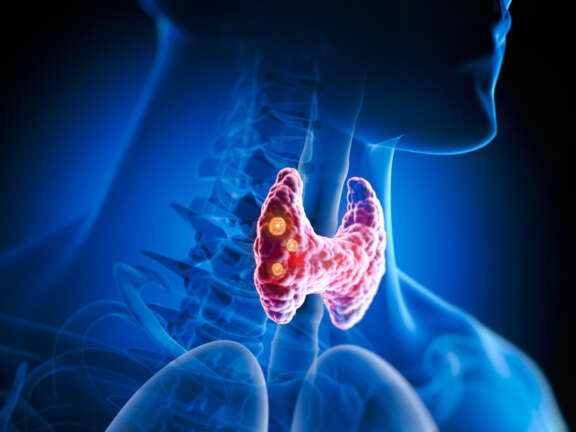Thyroid Diseases: What You Need to Know


Most of us give little thought to our thyroid, but this small butterfly-shaped gland in the front of your neck plays a very important role in your health, controlling everything from your metabolism and energy level to your heart rate and more.
It’s estimated that about 20 million people in the US have some form of thyroid disease, and up to 60% of them don’t even know it. In Texas, thyroid issues follow national trends, but the state has the second-highest rate of thyroid cancer and the third-highest rate of deaths from it. The good news? Regular thyroid screenings can help catch problems early and save lives.
January is Thyroid Awareness Month—the perfect time to learn more about this small, yet mighty organ and take steps toward better health.
How Your Thyroid Works
Your thyroid gland produces two key hormones: thyroxine (T4) and triiodothyronine (T3). These hormones are responsible for regulating your body's metabolism, which affects how quickly or slowly your body uses energy. If your thyroid over- or under-produces these hormones, it can lead to weight fluctuations, changes in energy levels, hair loss, skin issues, and more.
Your thyroid is controlled by your pituitary gland, which releases thyroid-stimulating hormone (TSH). This hormone helps the body produce more T3 and T4. If your thyroid is overactive or underactive, this feedback loop gets disrupted, leading to thyroid diseases.
Thyroid hormones also impact your heart rate, body temperature, muscle strength, and digestive system. To put it simply, the thyroid acts as your body’s thermostat, regulating energy production and keeping everything in balance.
Common Thyroid Diseases
Several thyroid diseases can affect your thyroid and its function. The most common ones include hyperthyroidism, hypothyroidism, Graves’ disease, and Hashimoto’s thyroiditis.
Hyperthyroidism
Hyperthyroidism occurs when the thyroid gland becomes overactive and produces too much thyroid hormone.
This results in faster metabolism, leading to unexplained weight loss, an increased heart rate or palpitations, nervousness and irritability, tremors (shaky hands), sweating, heat intolerance, and frequent bowel movements.
Graves’ Disease
Graves’ disease, which is the most common cause of hyperthyroidism, is an autoimmune condition where the body mistakenly attacks the thyroid.
In addition to the symptoms mentioned above for hyperthyroidism, people with Graves’ disease may also experience bulging eyes—a condition known as Graves’ orbitopathy. This disease affects more women than men and often appears in young adulthood or middle age.
Hypothyroidism
Hypothyroidism is the opposite of hyperthyroidism. When the thyroid is underactive, it does not produce enough thyroid hormones.
This slows down the body’s metabolism, leading to fatigue and weakness, weight gain, sensitivity to cold, dry skin and hair, depression, and constipation.
Hashimoto’s Thyroiditis
Hashimoto’s thyroiditis, which is the most common cause of hypothyroidism in the US, is an autoimmune disease where the immune system attacks the thyroid gland, causing chronic inflammation and a gradual loss of thyroid function.
Like other autoimmune diseases, Hashimoto’s is more common in women and typically develops in middle age. While the exact cause is unknown, genetics and environmental factors, such as stress or viral infections, may play a role.
Thyroid Diseases Are More Common in Women
While more than 12% of those in the US will develop a thyroid condition during their lifetime, women are five to eight times more likely to develop a thyroid disorder than men.
There are several reasons why women are more prone to thyroid issues:
- Hormonal changes: Women experience hormonal fluctuations throughout their lives, including during puberty, pregnancy, and menopause. These hormonal changes can impact thyroid function, making women more prone to developing thyroid disorders.
- Autoimmune diseases: Autoimmune diseases are more common in women, likely due to differences in immune system function between men and women.
- Genetics: If a family member has a thyroid disorder, you may be more likely to develop one yourself. Women may have a stronger genetic likelihood of developing these conditions.
Thyroid Screenings: Catching Issues Early
Your Innovista Medical Center primary care provider (PCP) can catch potential thyroid problems before they become serious. One of the simplest ways they do this is with thyroid checks, which are an important women’s health screening that begins at age 35.
Your provider will check your TSH levels. If they are too high, it could mean hypothyroidism; they are low, you may have hyperthyroidism.
If your TSH levels aren’t where they should be, your provider may recommend additional testing, like checking your T3 and T4 hormone levels or using an ultrasound to take a closer look at your thyroid. If they think an autoimmune thyroid disease like Hashimoto’s thyroiditis or Graves’ disease could be the cause, they might test you for specific antibodies to confirm the diagnosis.
If your primary care provider finds a thyroid issue, you may be referred to a Blue Cross and Blue Shield of Texas in-network endocrinologist for more in-depth care. In that case, your provider and the specialist will work together to make sure you have a good long-term care plan.
Stay Informed and Stay Healthy
While thyroid conditions can sometimes feel overwhelming, the good news is that with early detection and the right treatment, they’re completely manageable.
If you’re due for your annual checkup, now is the perfect time to schedule it and discuss getting important screenings, like a thyroid check. Also, if you’re experiencing symptoms that could suggest a thyroid issue, be sure to bring that to your provider’s attention. We’re here to listen, support you, and answer any questions you may have so you feel your best!
